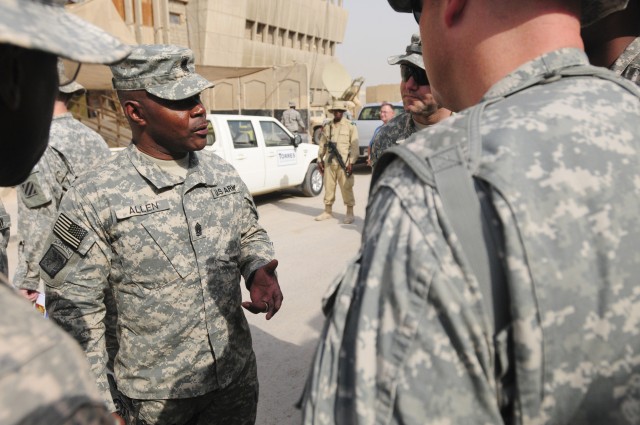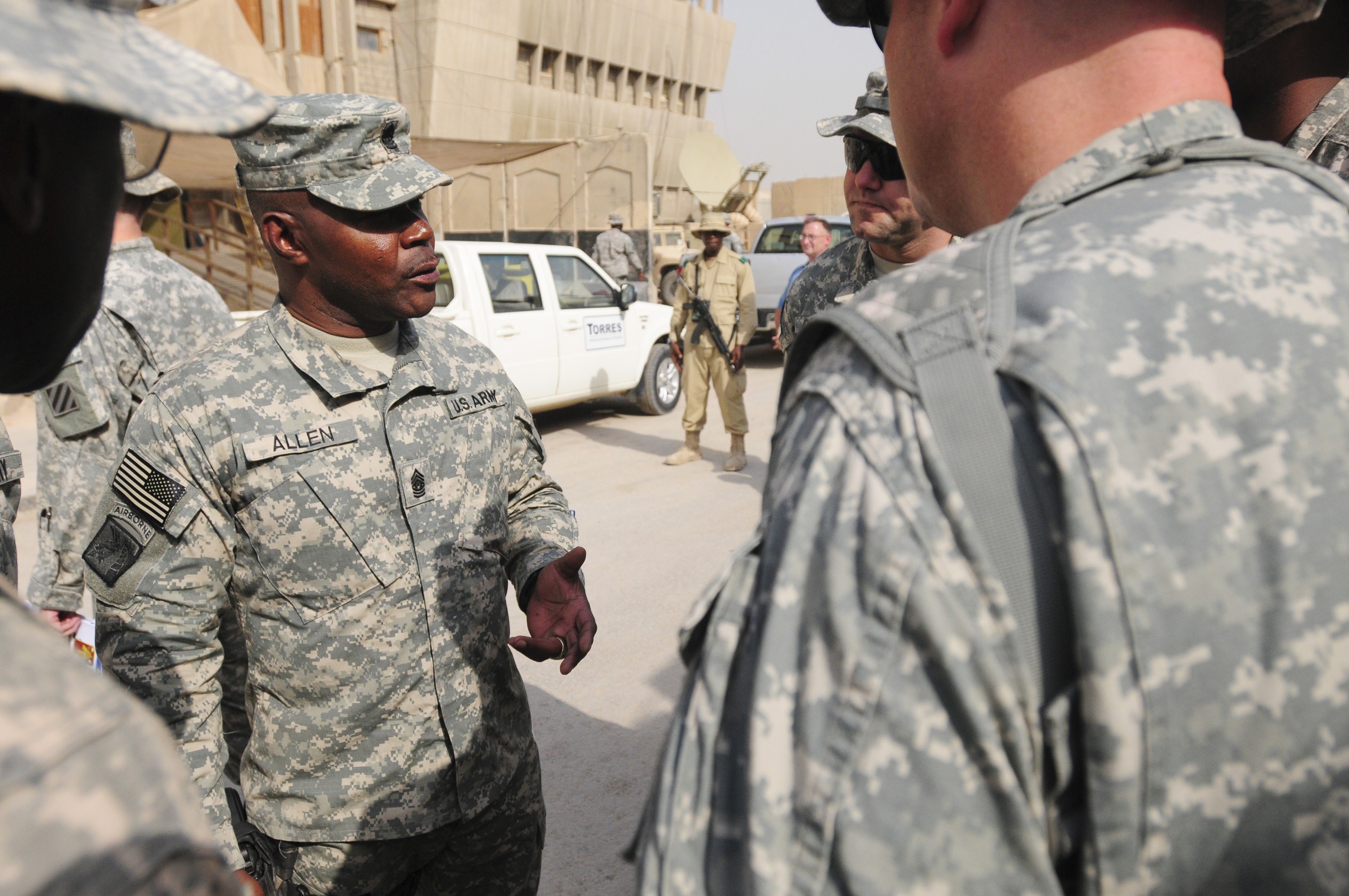
CAMP VICTORY, Iraq (Army News Service, Nov. 4, 2010) -- Soldiers have high expectations of their noncommissioned officers, said the top NCO in Iraq, a quality that has remained constant throughout his 35 years as a Soldier.
"If you ask any Soldier out there, they'll probably tell you they expect their noncommissioned officers to get them to the right place at the right time, with the right equipment to do whatever mission they're given," said Command Sgt. Maj. Joseph R. Allen, the United States Forces-Iraq command sergeant major.
As the U.S. military mission in Iraq continues to move forward, Allen said his job is to make sure the troops are performing at their best and that the Soldiers, Sailors, Airmen, and Marines understand that although the mission has changed, Iraq can still be a dangerous place, and it's imperative that everyone stay committed and focused.
"We still partner with the Iraqi Security Forces, Border Patrols and the Iraqi Police," Allen said. "Yes, we have a new mission set, but the fact of the matter is, any time a Soldier goes outside the gate they're in the same posture that they were at the height of this war."
While the mission may still be challenging, Allen is confident that, thanks to today's leadership culture, Soldiers are up to the task. He now sees junior NCOs entrusted with life-or-death decisions on a daily basis because they understand the commander's intent and the rules of engagement.
"Those young guys and gals out there, give them basic focusing guidance and let them go get at it. We empower them to use their own decision-making process to execute their mission. I see that a lot now," he said.
According to Allen, a big part of the success in Iraq is due to the dedication and commitment of young servicemembers and junior leaders.
And now, with the Iraqi Security Forces in the lead and U.S. forces advising, assisting and training, he said young leaders are still just as critical to the mission.
He said young troops "expect noncommissioned officers, more than any other leader, to protect them from all the stuff that rolls down hill, to provide them with good leadership, and they expect noncommissioned officers to take care of their families."
Allen has worked hard to live up to those expectations, standing up for his Soldiers when circumstances required him to.
As a brigade command sergeant major, he once appeared before a court-martial as a character witness for a Soldier his leadership had recommended for punishment. It's Allen's willingness to go out on a limb and fight for Soldiers that has earned him the respect of the troops he's led throughout his career.
Allen said he believes leaders want to do the right thing and for the most part they get it right.
"I'll always make sure Soldiers are getting a fair shake and that leaders are looking out for the Soldier," said Allen. "I've done it all my life and it's all I know how to do."
During a recent trip to Joint Security Station Loyalty with Gen. Lloyd J. Austin III, USF-I commanding general, Allen talked to the senior NCOs of the 1st Battalion, 41st Field Artillery, 1st Advise and Assist Brigade, 3rd Infantry Division, and drove home the importance of listening to junior servicemembers.
While Austin later spoke with troops preparing for a mission, Allen pulled the first sergeants aside for a huddle.
He shared with them his certainty that everyone has something significant going on in their lives that might affect their performance and encouraged them to remember that as they deal with their subordinates.
Allen said he recently caught a group of Soldiers off guard by telling them something they weren't used to hearing from such a senior NCO.
"I work for you," he told them. "If there's something I need to do, you need to tell me."
While taking action is a big part of being an NCO, Allen said the simple act of listening is a powerful tool for leaders, and it's a big part of his approach to dealing with servicemembers.
"Sometimes they just need an ear," he said. "They just need somebody to listen to their problems."
And with the stresses of deployment and the military's high operational tempo, servicemembers' problems can't be overlooked by NCOs.
He also shared some wisdom from Winston Churchill, which he often passes along to servicemembers who are having a difficult time.
"The bottom line is, when you think it's hell that you're going through, keep going man, just keep going," he told them. "You only get in trouble when you stop. Keep going, talk to somebody, but keep going. Don't stop whatever you do."
Five combat tours and three-and-a-half decades in the Army have taught Allen a lot about servicemembers and leaders. One thing he feels strongly about is that to truly be effective as a leader and taking care of your troops, you have to take care of yourself.
He said that when Soldiers start to feel stress overtake their mind and body, they've got to get away from the situation, regroup and come back ready to take it on.
"Go get your 'me-time' in and get yourself back together," he said. "That's what it takes most of the time, even if it's a walk somewhere. My whole attitude will change just because I went on a walk."
"We've come a long way but we've still got work to do. Our continued success will, in large part, depend on the conduct and professionalism of our force. I'm confident that our young men and women will keep doing the right thing and will stay focused and committed to the mission. Got to do it, that's the job, and we need to work together to be effective."

Social Sharing